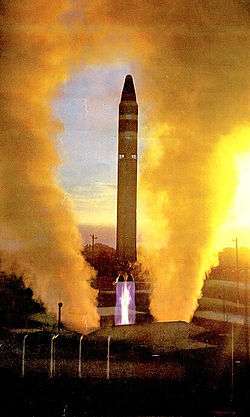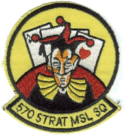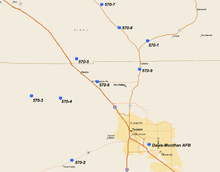570th Strategic Missile Squadron
| 570th Strategic Missile Squadron | |
|---|---|
 LGM-25C Titan II Test Launch at Vandenburg AFB, California | |
| Active | 1942–1945; 1962–1984 |
| Country | United States |
| Branch |
|
| Type | Squadron |
| Role | Intercontinental ballistic missile |
| Garrison/HQ | Davis-Monthan AFB, Arizona |
| Engagements |
World War II (EAME Theater) |
| Decorations |
Distinguished Unit Citation (2x) Air Force Outstanding Unit Award |
| Insignia | |
| 570th Strategic Missile Squadron emblem |
 |
The 570th Strategic Missile Squadron (570 SMS) is an inactive United States Air Force unit. It was last assigned to the 390th Strategic Missile Wing, stationed at Davis-Monthan Air Force Base, Arizona.
The 570 SMS was equipped with the LGM-25C Titan II Intercontinental ballistic missile (ICBM), with a mission of nuclear deterrence. The squadron was inactivated as part of the phaseout of the Titan II ICBM on 31 July 1984.
History
World War II
Activated in early 1943 as a B-17 Flying Fortress heavy bomber squadron, it trained under the Second Air Force. It deployed to England in the European Theater of Operations (ETO) during July 1943, where it was assigned to VIII Bomber Command as a strategic bombardment unit. It participated in the air offensive over Nazi Germany and Occupied Europe until the German surrender in May 1945. Its personnel demobilized in England and returned to the United States; the squadron was reassigned to the Second Air Force and was programmed to be re-equipped with B-29 Superfortresses for deployment to the Pacific Theater. The Japanese capitulation led to the units' inactivation in August 1945, as it was neither manned or equipped.
Intercontinental Ballistic Missile Squadron
The squadron was redesignated the 570th Strategic Missile Squadron and activated at Davis-Monthan Air Force Base, Arizona as a Strategic Air Command LGM-25C Titan II ICBM squadron in May 1962.[1] It operated nine Titan II underground silos, construction beginning in 1960. Site 570-2 went on alert status on 4 April 1963 and was the first Titan II to become operational.[2] The remaining eight sites became operational by June. The nine missile silos controlled by the 570th Strategic Missile Squadron remained on alert for over 20 years during the Cold War.
In October 1981, President Ronald Reagan announced that as part of the strategic modernization program, Titan II systems were to be retired by 1 October 1987. Inactivation of the sites began in July 1982 (570–9); the last site (570–4) on 7 May 1984. The squadron was inactivated on 31 July.
After removal from service, the silos had reusable equipment removed by Air Force personnel, contractors retrieved salvageable metals before destroying the silos with explosives and filling them in. Access to the vacated control centers was blocked off. Missile sites were later sold off to private ownership after demilitarization. Today the remains of the sites are still visible in aerial imagery, in various states of civil use or abandonment.
Lineage

- Constituted as the 570th Bombardment Squadron (Heavy) on 15 January 1943
- Activated on 26 January 1943
- Inactivated on 28 August 1945
- Re-designated as the 570th Strategic Missile Squadron, and activated, on 28 November 1961
- Organized on 1 May 1962
- Inactivated on 31 July 1984
Assignments
- 390th Bombardment Group, 26 January 1943 – 28 August 1945
- Strategic Air Command, 28 November 1961
- 390th Strategic Missile Wing, 1 May 1962 – 31 July 1984
Stations
- Geiger Field, Washington, 26 January 1943
- Great Falls Army Air Base, Montana, 6 June-4 July 1943
- RAF Framlingham (AAF-153), England, 26 July 1943 – 6 August 1945
- Sioux Falls Army Air Field, South Dakota, 14–28 August 1945
- Davis-Monthan AFB, Arizona, 1 May 1962 – 31 July 1984
Aircraft and missiles

- B-17 Flying Fortress, 1943–1945
- LGM-25C Titan II Missile, 1962–1984
- Operated nine missile sites:
- 570-1 (8 Jun 1963 – 12 May 1983), 7.0 mi W of Oracle, AZ 32°35′50″N 110°53′20″W / 32.59722°N 110.88889°W
- 570-2 (21 Mar 1963 – 4 Apr 1983), 3.4 mi ENE of Three Points, AZ 32°06′03″N 111°15′44″W / 32.10083°N 111.26222°W
- 570-3 (22 May 1963 – 27 Mar 1984), 14.7 mi WSW of Marana, AZ 32°22′04″N 111°27′43″W / 32.36778°N 111.46194°W
- 570-4 (1 Jun 1963 – 7 May 1984), 7.6 mi SW of Marana, AZ 32°21′33″N 111°19′05″W / 32.35917°N 111.31806°W
- 570-5 (3 May 1963 – 21 May 1984), 6.1 mi N of Marana, AZ 32°31′23″N 111°14′21″W / 32.52306°N 111.23917°W
- 570-6 (22 Apr 1963 – 27 Feb 1984), 5.1 mi E of Marana, AZ 32°25′40″N 111°08′15″W / 32.42778°N 111.13750°W
- 570-7 (24 May 1963 – 3 Jan 1983), 17.1 mi NW of Oracle Junction, AZ 32°44′55″N 111°06′57″W / 32.74861°N 111.11583°W
- 570-8 (25 Jun 1963 – 27 Jun 1983), 8.8 mi NW of Oracle Junction, AZ 32°39′08″N 111°01′43″W / 32.65222°N 111.02861°W
- 570-9 (14 Jun 1963 – 2 Jul 1982), 5.3 mi S of Oracle Junction, AZ 32°28′43″N 110°55′44″W / 32.47861°N 110.92889°W
See also
References
Notes
Bibliography
![]()
- Maurer, Maurer, ed. (1983) [1961]. Air Force Combat Units of World War II (PDF) (reprint ed.). Washington, DC: Office of Air Force History. ISBN 0-912799-02-1. LCCN 61060979.
- Maurer, Maurer, ed. (1982) [1969]. Combat Squadrons of the Air Force, World War II (PDF) (reprint ed.). Washington, DC: Office of Air Force History. ISBN 0-405-12194-6. LCCN 70605402. OCLC 72556.
- Narducci, Henry M. (1988). Strategic Air Command and the Alert Program: A Brief History. Offutt AFB, NE: Office of the Historian, Strategic Air Command. Retrieved February 18, 2018.

